We've all had one of those nights—but how do you function the next day? Here are some science-based tips for staying alert.
Turn on a bright light
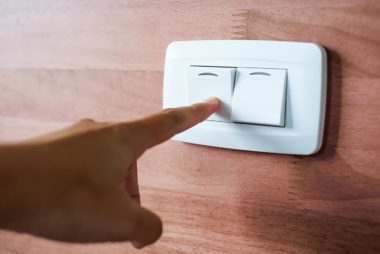 JAJALADDAWAN/SHUTTERSTOCK
JAJALADDAWAN/SHUTTERSTOCKThe National Sleep Foundation recommends that adults get between seven and nine hours of sleep a night—and although we should aim for that, it doesn't always happen. A sick kid, deadlines on a work project, or even insomnia can cause us to get too little shut-eye. But how to stay awake when that happens? Besides taking a nap, which isn't usually possible when we have to face the day, here's what you can do: Reset your internal clock with the help of light. "Light therapy delivered for 20 minutes upon awakening or at particular times of day can be very effective," says sleep expert Michael Breus, PhD, author of
The Power of When. "There are special [blue spectrum] bulbs that are commercially available that can help a person wake up—I use them in my bathroom." A study from the American Academy of Sleep Medicine found that bright light at the end of a night shift was effective in increasing alertness. If you
can't sleep, one of these 10 medical conditions could be why.
Get some sun
 KITE RIN/SHUTTERSTOCK
KITE RIN/SHUTTERSTOCKSunlight helps to set our circadian rhythm naturally, so it might be even more effective than artificial light at making you feel bright-eyed and bushy tailed. "Sunlight signals your body and mind to wake up more," says sleep expert Richard Shane, PhD, creator of the
Sleep Easilymethod. "Get out into the sun for even five to 10 minutes, close your eyes, and turn your face toward it." According to the National Sleep Foundation, morning exposure to the sun will give you enough rays to let your brain know it's time to start the day. Plus, studies have shown getting fresh air also has revitalizing effects, so stepping outside is doubly effective. Bonus: Sun exposure can reset your internal clock, helping you sleep better in the future, according to research. Find out more about
how to sleep better when you're sleep deprived.
Exercise
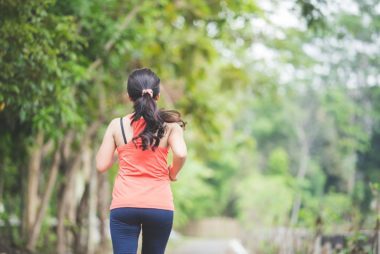 ODUA IMAGES/SHUTTERSTOCK
ODUA IMAGES/SHUTTERSTOCKGet moving to stimulate your body. "The increased blood flow will help you feel more energized," Dr. Shane says. In a recent study from the University of Georgia, researchers found that sleep-deprived participants who walked up and down stairs for 10 minutes felt more energized than drinking the amount of caffeine in a can of soda. In addition, the exercise increased their motivation for work. According to the study author, Patrick O'Connor, the experiment focused on stairs because the typical office worker has easy access to them—so you can try this the next time you're fading fast at your desk. Another study from the Netherlands found that short bursts of exercise were effective in enhancing brain function, another benefit if you've gotten too little sleep.
Splash cold water on your face
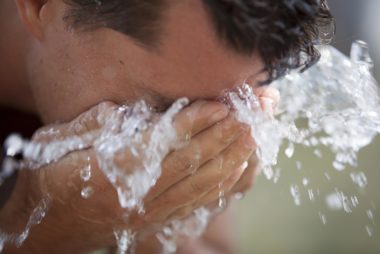 PRIXEL CREATIVE/SHUTTERSTOCK
PRIXEL CREATIVE/SHUTTERSTOCKWhile warmth makes us feel like cozying up, exposure to colder temperatures is reinvigorating. If you need a quick pick-me-up while at work, try splashing your face with cool or cold water in the bathroom sink. "That's a stimulant to your skin and nervous system, which wakes you up," Dr. Shane says. Research from the University of Chicago found that participants exposed to cold water performed better on an alertness test than people exposed to warm water. This may happen because cold water is a stressor, so the body releases hormones like noradrenaline in response, which puts us on alert. Don't miss these
life-saving ways to stay awake while driving.
Take a shower
 ANNA OM/SHUTTERSTOCK
ANNA OM/SHUTTERSTOCKEven better, expose your whole body to cool water to wake yourself up. "There is some data that a cool, not cold, shower in the a.m. can be very alerting," Dr. Breus says. The cool water stimulates blood flow and gives you a rush of endorphins. You could also consider a polar bear plunge if you have access to a pool. "There are many stories out these about people doing a 'cold swim' in the early a.m.," Dr. Breus says. "I have tried this personally and while invigorating, jumping into a freezing pool of water is not a ton of fun. However, a cool shower is easy to do, and very effective for me." If you can't bring yourself to hop right into a cool shower, Dr. Shane says suggests gradually turning the water temperature colder after it's already running over you.
Do some deep breathing
 VIOLETBLUE/SHUTTERSTOCK
VIOLETBLUE/SHUTTERSTOCKAlthough we think of deep breathing as calming, and therefore potentially more likely to put us to sleep, the increased oxygen flow actually helps the brain work better. A
study from Northwestern found that breathing in deeply improved cognitive function. "With this I find that my patients may not be more alert but they are more focused," Dr. Breus says, which allows you to get through a mental task easier. Dr. Shane says deep breathing can also help you shake off the tired feeling, giving you more energy. Staying awake when you want to go to sleep puts stress on the body, and in stressful situations, our breathing tends to be shallow. "Breathe just a little more deeply and slowly than usual, and your breath will become smoother and more comfortable," he says. "That calms tension that had been contributing to your tiredness."
Drink water
 GOODLUZ/SHUTTERSTOCK
GOODLUZ/SHUTTERSTOCKStaying fully hydrated can help keep the body working optimally, making us feel more awake when we're sleep-deprived. Our bodies are 60 percent water, so we need the fluid to function—if we're dehydrated, the effects of sleep deprivation are even worse. "When we are tired, our bodies often feel 'dried out,' so drinking lots of water or good fluids can help you feel less tired," Dr. Shane says.
Research has shown that even mild dehydration causes fatigue as well as a reduction in brain function. The opposite may be true as well: A
study from the U.K. found that students who brought water into exams did better than those who didn't (and not just because smarter people come prepared!).
Give your eyes a break
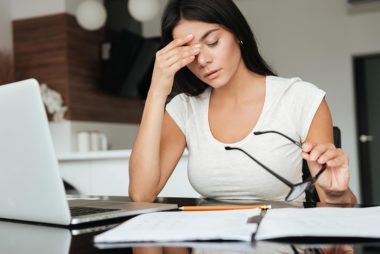 DEAN DROBOT/SHUTTERSTOCK
DEAN DROBOT/SHUTTERSTOCKSwollen, red eyes are often the result of not getting enough sleep, and this can make it hard to focus on the computer screen at work the next day. "Using eye lubricant to moisten your eyes can help you feel less tired," Dr. Shane says. In addition, make sure to take frequent breaks to look away from your screen so your eyes can readjust and not get as fatigued. The
American Optometric Association recommends sticking to the 20-20-20 rule: Every 20 minutes, stare at something 20 feet away for 20 seconds. This can help prevent digital eye strain, which could be made worse by sleep deprivation. Try some of these other
ideas to boost energy naturally, too.
Keep your brain stimulated
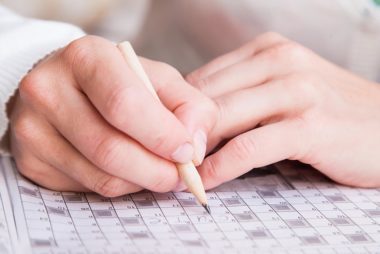 DJEM/SHUTTERSTOCK
DJEM/SHUTTERSTOCKIf you're wondering how to stay awake, you'll definitely want to keep your brain moving with some mental exercise. "Engaging in something interesting to do or talk about can stimulate your mind to feel more awake," Dr. Shane says. Simply having a conversation can ramp up your cognitive processes and make you "forget" you're tired. Or, focusing your mind on an engaging task—either a work project you're excited about, or a mental break like a crossword puzzle or game—can help keep you alert. Interestingly,
studiesshow we tend to be more creative when we're tired because our ideas are not as focused, so take advantage to write, draw, or solve some brain twisters.
Eat energy-boosting snacks
 JULIA SUDNITSKAYA/SHUTTERSTOCK
JULIA SUDNITSKAYA/SHUTTERSTOCKWhen your body is missing the rest and repair it needs from sleep, you can at least make sure it has the fuel it requires to keep going—and to keep your blood sugar levels stable. "Eating protein can give you more energy, but stay away from carbohydrates and fats, as they can make you feel more sluggish," Dr. Shane says. "Be careful with sugar because while it may temporarily give you more energy, for many people, that is followed by a slump." If you're in a meeting and can't chow down,
research shows that popping a piece of gum can also work to stimulate the brain. It's a simple, yet effective, solution for how to stay awake. Find out more tips for energy after lunch to prevent falling asleep at your desk. These
natural energy boosters just might change your life.
Play upbeat music
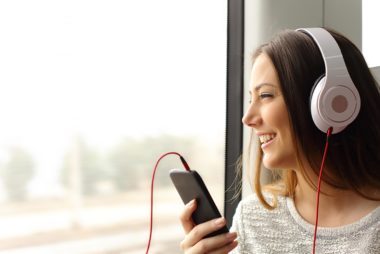 ANTONIO GUILLEM/SHUTTERSTOCK
ANTONIO GUILLEM/SHUTTERSTOCKNothing gets your blood pumping more than a good song. Instead of dragging yourself through your morning routine, try bouncing around to a favorite tune to increase your energy level. "The sound stimulates your nervous system," Dr. Shane says. A
study from Stanford found that music also stimulates areas of the brain involved with paying attention and memory. Additionally, it may help you keep alert in the car. "If you are driving, play loud music and open the window," Dr. Shane says. But, "be
very careful and pull over if you are not alert enough to drive safely."
Drink caffeine
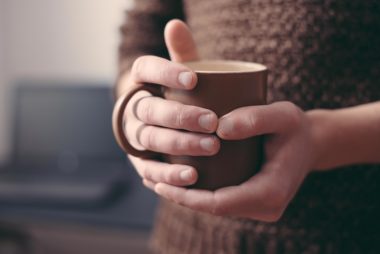 FILE404/SHUTTERSTOCK
FILE404/SHUTTERSTOCKLastly, you could rely on that old standby for how to stay awake: caffeine. Tons of
research, and the first-hand accounts of formerly sleepy people everywhere, can attest to its effectiveness. But, it is a drug, so you should use it wisely. "Stimulant ingestion can be caffeine, the most commonly used substance, or an 'energy drink,' a shot of vitamins and sometimes caffeine," Dr. Breus says. "However if used too often a person will adapt to it; and if you use it too much, your brain will have difficulty functioning without it." Dr. Shane also warns to not drink caffeine any later than early afternoon, as you may have trouble getting to sleep at night, which will start the sleep deprivation cycle over again. If you do have time for a quick cat nap, Dr. Breus has a suggestion for timing your caffeine intake. "My favorite technique is called a nap-a-latte," he says. "Here I have people drink a cup of drip coffee and then take a 25-minute nap." The cat nap will reduce sleepiness, and then caffeine will kick in—so he says you'll be good for 4 hours! These are the
18 most effective ways to beat the afternoon slump at work.
 JAJALADDAWAN/SHUTTERSTOCKThe National Sleep Foundation recommends that adults get between seven and nine hours of sleep a night—and although we should aim for that, it doesn't always happen. A sick kid, deadlines on a work project, or even insomnia can cause us to get too little shut-eye. But how to stay awake when that happens? Besides taking a nap, which isn't usually possible when we have to face the day, here's what you can do: Reset your internal clock with the help of light. "Light therapy delivered for 20 minutes upon awakening or at particular times of day can be very effective," says sleep expert Michael Breus, PhD, author of The Power of When. "There are special [blue spectrum] bulbs that are commercially available that can help a person wake up—I use them in my bathroom." A study from the American Academy of Sleep Medicine found that bright light at the end of a night shift was effective in increasing alertness. If you can't sleep, one of these 10 medical conditions could be why.
JAJALADDAWAN/SHUTTERSTOCKThe National Sleep Foundation recommends that adults get between seven and nine hours of sleep a night—and although we should aim for that, it doesn't always happen. A sick kid, deadlines on a work project, or even insomnia can cause us to get too little shut-eye. But how to stay awake when that happens? Besides taking a nap, which isn't usually possible when we have to face the day, here's what you can do: Reset your internal clock with the help of light. "Light therapy delivered for 20 minutes upon awakening or at particular times of day can be very effective," says sleep expert Michael Breus, PhD, author of The Power of When. "There are special [blue spectrum] bulbs that are commercially available that can help a person wake up—I use them in my bathroom." A study from the American Academy of Sleep Medicine found that bright light at the end of a night shift was effective in increasing alertness. If you can't sleep, one of these 10 medical conditions could be why. KITE RIN/SHUTTERSTOCKSunlight helps to set our circadian rhythm naturally, so it might be even more effective than artificial light at making you feel bright-eyed and bushy tailed. "Sunlight signals your body and mind to wake up more," says sleep expert Richard Shane, PhD, creator of the Sleep Easilymethod. "Get out into the sun for even five to 10 minutes, close your eyes, and turn your face toward it." According to the National Sleep Foundation, morning exposure to the sun will give you enough rays to let your brain know it's time to start the day. Plus, studies have shown getting fresh air also has revitalizing effects, so stepping outside is doubly effective. Bonus: Sun exposure can reset your internal clock, helping you sleep better in the future, according to research. Find out more about how to sleep better when you're sleep deprived.
KITE RIN/SHUTTERSTOCKSunlight helps to set our circadian rhythm naturally, so it might be even more effective than artificial light at making you feel bright-eyed and bushy tailed. "Sunlight signals your body and mind to wake up more," says sleep expert Richard Shane, PhD, creator of the Sleep Easilymethod. "Get out into the sun for even five to 10 minutes, close your eyes, and turn your face toward it." According to the National Sleep Foundation, morning exposure to the sun will give you enough rays to let your brain know it's time to start the day. Plus, studies have shown getting fresh air also has revitalizing effects, so stepping outside is doubly effective. Bonus: Sun exposure can reset your internal clock, helping you sleep better in the future, according to research. Find out more about how to sleep better when you're sleep deprived. ODUA IMAGES/SHUTTERSTOCKGet moving to stimulate your body. "The increased blood flow will help you feel more energized," Dr. Shane says. In a recent study from the University of Georgia, researchers found that sleep-deprived participants who walked up and down stairs for 10 minutes felt more energized than drinking the amount of caffeine in a can of soda. In addition, the exercise increased their motivation for work. According to the study author, Patrick O'Connor, the experiment focused on stairs because the typical office worker has easy access to them—so you can try this the next time you're fading fast at your desk. Another study from the Netherlands found that short bursts of exercise were effective in enhancing brain function, another benefit if you've gotten too little sleep.
ODUA IMAGES/SHUTTERSTOCKGet moving to stimulate your body. "The increased blood flow will help you feel more energized," Dr. Shane says. In a recent study from the University of Georgia, researchers found that sleep-deprived participants who walked up and down stairs for 10 minutes felt more energized than drinking the amount of caffeine in a can of soda. In addition, the exercise increased their motivation for work. According to the study author, Patrick O'Connor, the experiment focused on stairs because the typical office worker has easy access to them—so you can try this the next time you're fading fast at your desk. Another study from the Netherlands found that short bursts of exercise were effective in enhancing brain function, another benefit if you've gotten too little sleep. PRIXEL CREATIVE/SHUTTERSTOCKWhile warmth makes us feel like cozying up, exposure to colder temperatures is reinvigorating. If you need a quick pick-me-up while at work, try splashing your face with cool or cold water in the bathroom sink. "That's a stimulant to your skin and nervous system, which wakes you up," Dr. Shane says. Research from the University of Chicago found that participants exposed to cold water performed better on an alertness test than people exposed to warm water. This may happen because cold water is a stressor, so the body releases hormones like noradrenaline in response, which puts us on alert. Don't miss these life-saving ways to stay awake while driving.
PRIXEL CREATIVE/SHUTTERSTOCKWhile warmth makes us feel like cozying up, exposure to colder temperatures is reinvigorating. If you need a quick pick-me-up while at work, try splashing your face with cool or cold water in the bathroom sink. "That's a stimulant to your skin and nervous system, which wakes you up," Dr. Shane says. Research from the University of Chicago found that participants exposed to cold water performed better on an alertness test than people exposed to warm water. This may happen because cold water is a stressor, so the body releases hormones like noradrenaline in response, which puts us on alert. Don't miss these life-saving ways to stay awake while driving. ANNA OM/SHUTTERSTOCKEven better, expose your whole body to cool water to wake yourself up. "There is some data that a cool, not cold, shower in the a.m. can be very alerting," Dr. Breus says. The cool water stimulates blood flow and gives you a rush of endorphins. You could also consider a polar bear plunge if you have access to a pool. "There are many stories out these about people doing a 'cold swim' in the early a.m.," Dr. Breus says. "I have tried this personally and while invigorating, jumping into a freezing pool of water is not a ton of fun. However, a cool shower is easy to do, and very effective for me." If you can't bring yourself to hop right into a cool shower, Dr. Shane says suggests gradually turning the water temperature colder after it's already running over you.
ANNA OM/SHUTTERSTOCKEven better, expose your whole body to cool water to wake yourself up. "There is some data that a cool, not cold, shower in the a.m. can be very alerting," Dr. Breus says. The cool water stimulates blood flow and gives you a rush of endorphins. You could also consider a polar bear plunge if you have access to a pool. "There are many stories out these about people doing a 'cold swim' in the early a.m.," Dr. Breus says. "I have tried this personally and while invigorating, jumping into a freezing pool of water is not a ton of fun. However, a cool shower is easy to do, and very effective for me." If you can't bring yourself to hop right into a cool shower, Dr. Shane says suggests gradually turning the water temperature colder after it's already running over you. VIOLETBLUE/SHUTTERSTOCKAlthough we think of deep breathing as calming, and therefore potentially more likely to put us to sleep, the increased oxygen flow actually helps the brain work better. A study from Northwestern found that breathing in deeply improved cognitive function. "With this I find that my patients may not be more alert but they are more focused," Dr. Breus says, which allows you to get through a mental task easier. Dr. Shane says deep breathing can also help you shake off the tired feeling, giving you more energy. Staying awake when you want to go to sleep puts stress on the body, and in stressful situations, our breathing tends to be shallow. "Breathe just a little more deeply and slowly than usual, and your breath will become smoother and more comfortable," he says. "That calms tension that had been contributing to your tiredness."
VIOLETBLUE/SHUTTERSTOCKAlthough we think of deep breathing as calming, and therefore potentially more likely to put us to sleep, the increased oxygen flow actually helps the brain work better. A study from Northwestern found that breathing in deeply improved cognitive function. "With this I find that my patients may not be more alert but they are more focused," Dr. Breus says, which allows you to get through a mental task easier. Dr. Shane says deep breathing can also help you shake off the tired feeling, giving you more energy. Staying awake when you want to go to sleep puts stress on the body, and in stressful situations, our breathing tends to be shallow. "Breathe just a little more deeply and slowly than usual, and your breath will become smoother and more comfortable," he says. "That calms tension that had been contributing to your tiredness."  GOODLUZ/SHUTTERSTOCKStaying fully hydrated can help keep the body working optimally, making us feel more awake when we're sleep-deprived. Our bodies are 60 percent water, so we need the fluid to function—if we're dehydrated, the effects of sleep deprivation are even worse. "When we are tired, our bodies often feel 'dried out,' so drinking lots of water or good fluids can help you feel less tired," Dr. Shane says. Research has shown that even mild dehydration causes fatigue as well as a reduction in brain function. The opposite may be true as well: A study from the U.K. found that students who brought water into exams did better than those who didn't (and not just because smarter people come prepared!).
GOODLUZ/SHUTTERSTOCKStaying fully hydrated can help keep the body working optimally, making us feel more awake when we're sleep-deprived. Our bodies are 60 percent water, so we need the fluid to function—if we're dehydrated, the effects of sleep deprivation are even worse. "When we are tired, our bodies often feel 'dried out,' so drinking lots of water or good fluids can help you feel less tired," Dr. Shane says. Research has shown that even mild dehydration causes fatigue as well as a reduction in brain function. The opposite may be true as well: A study from the U.K. found that students who brought water into exams did better than those who didn't (and not just because smarter people come prepared!). DEAN DROBOT/SHUTTERSTOCKSwollen, red eyes are often the result of not getting enough sleep, and this can make it hard to focus on the computer screen at work the next day. "Using eye lubricant to moisten your eyes can help you feel less tired," Dr. Shane says. In addition, make sure to take frequent breaks to look away from your screen so your eyes can readjust and not get as fatigued. The American Optometric Association recommends sticking to the 20-20-20 rule: Every 20 minutes, stare at something 20 feet away for 20 seconds. This can help prevent digital eye strain, which could be made worse by sleep deprivation. Try some of these other ideas to boost energy naturally, too.
DEAN DROBOT/SHUTTERSTOCKSwollen, red eyes are often the result of not getting enough sleep, and this can make it hard to focus on the computer screen at work the next day. "Using eye lubricant to moisten your eyes can help you feel less tired," Dr. Shane says. In addition, make sure to take frequent breaks to look away from your screen so your eyes can readjust and not get as fatigued. The American Optometric Association recommends sticking to the 20-20-20 rule: Every 20 minutes, stare at something 20 feet away for 20 seconds. This can help prevent digital eye strain, which could be made worse by sleep deprivation. Try some of these other ideas to boost energy naturally, too. DJEM/SHUTTERSTOCKIf you're wondering how to stay awake, you'll definitely want to keep your brain moving with some mental exercise. "Engaging in something interesting to do or talk about can stimulate your mind to feel more awake," Dr. Shane says. Simply having a conversation can ramp up your cognitive processes and make you "forget" you're tired. Or, focusing your mind on an engaging task—either a work project you're excited about, or a mental break like a crossword puzzle or game—can help keep you alert. Interestingly, studiesshow we tend to be more creative when we're tired because our ideas are not as focused, so take advantage to write, draw, or solve some brain twisters.
DJEM/SHUTTERSTOCKIf you're wondering how to stay awake, you'll definitely want to keep your brain moving with some mental exercise. "Engaging in something interesting to do or talk about can stimulate your mind to feel more awake," Dr. Shane says. Simply having a conversation can ramp up your cognitive processes and make you "forget" you're tired. Or, focusing your mind on an engaging task—either a work project you're excited about, or a mental break like a crossword puzzle or game—can help keep you alert. Interestingly, studiesshow we tend to be more creative when we're tired because our ideas are not as focused, so take advantage to write, draw, or solve some brain twisters. JULIA SUDNITSKAYA/SHUTTERSTOCKWhen your body is missing the rest and repair it needs from sleep, you can at least make sure it has the fuel it requires to keep going—and to keep your blood sugar levels stable. "Eating protein can give you more energy, but stay away from carbohydrates and fats, as they can make you feel more sluggish," Dr. Shane says. "Be careful with sugar because while it may temporarily give you more energy, for many people, that is followed by a slump." If you're in a meeting and can't chow down, research shows that popping a piece of gum can also work to stimulate the brain. It's a simple, yet effective, solution for how to stay awake. Find out more tips for energy after lunch to prevent falling asleep at your desk. These natural energy boosters just might change your life.
JULIA SUDNITSKAYA/SHUTTERSTOCKWhen your body is missing the rest and repair it needs from sleep, you can at least make sure it has the fuel it requires to keep going—and to keep your blood sugar levels stable. "Eating protein can give you more energy, but stay away from carbohydrates and fats, as they can make you feel more sluggish," Dr. Shane says. "Be careful with sugar because while it may temporarily give you more energy, for many people, that is followed by a slump." If you're in a meeting and can't chow down, research shows that popping a piece of gum can also work to stimulate the brain. It's a simple, yet effective, solution for how to stay awake. Find out more tips for energy after lunch to prevent falling asleep at your desk. These natural energy boosters just might change your life. ANTONIO GUILLEM/SHUTTERSTOCKNothing gets your blood pumping more than a good song. Instead of dragging yourself through your morning routine, try bouncing around to a favorite tune to increase your energy level. "The sound stimulates your nervous system," Dr. Shane says. A study from Stanford found that music also stimulates areas of the brain involved with paying attention and memory. Additionally, it may help you keep alert in the car. "If you are driving, play loud music and open the window," Dr. Shane says. But, "be very careful and pull over if you are not alert enough to drive safely."
ANTONIO GUILLEM/SHUTTERSTOCKNothing gets your blood pumping more than a good song. Instead of dragging yourself through your morning routine, try bouncing around to a favorite tune to increase your energy level. "The sound stimulates your nervous system," Dr. Shane says. A study from Stanford found that music also stimulates areas of the brain involved with paying attention and memory. Additionally, it may help you keep alert in the car. "If you are driving, play loud music and open the window," Dr. Shane says. But, "be very careful and pull over if you are not alert enough to drive safely." FILE404/SHUTTERSTOCKLastly, you could rely on that old standby for how to stay awake: caffeine. Tons of research, and the first-hand accounts of formerly sleepy people everywhere, can attest to its effectiveness. But, it is a drug, so you should use it wisely. "Stimulant ingestion can be caffeine, the most commonly used substance, or an 'energy drink,' a shot of vitamins and sometimes caffeine," Dr. Breus says. "However if used too often a person will adapt to it; and if you use it too much, your brain will have difficulty functioning without it." Dr. Shane also warns to not drink caffeine any later than early afternoon, as you may have trouble getting to sleep at night, which will start the sleep deprivation cycle over again. If you do have time for a quick cat nap, Dr. Breus has a suggestion for timing your caffeine intake. "My favorite technique is called a nap-a-latte," he says. "Here I have people drink a cup of drip coffee and then take a 25-minute nap." The cat nap will reduce sleepiness, and then caffeine will kick in—so he says you'll be good for 4 hours! These are the 18 most effective ways to beat the afternoon slump at work.
FILE404/SHUTTERSTOCKLastly, you could rely on that old standby for how to stay awake: caffeine. Tons of research, and the first-hand accounts of formerly sleepy people everywhere, can attest to its effectiveness. But, it is a drug, so you should use it wisely. "Stimulant ingestion can be caffeine, the most commonly used substance, or an 'energy drink,' a shot of vitamins and sometimes caffeine," Dr. Breus says. "However if used too often a person will adapt to it; and if you use it too much, your brain will have difficulty functioning without it." Dr. Shane also warns to not drink caffeine any later than early afternoon, as you may have trouble getting to sleep at night, which will start the sleep deprivation cycle over again. If you do have time for a quick cat nap, Dr. Breus has a suggestion for timing your caffeine intake. "My favorite technique is called a nap-a-latte," he says. "Here I have people drink a cup of drip coffee and then take a 25-minute nap." The cat nap will reduce sleepiness, and then caffeine will kick in—so he says you'll be good for 4 hours! These are the 18 most effective ways to beat the afternoon slump at work.
মন্তব্যসমূহ
একটি মন্তব্য পোস্ট করুন